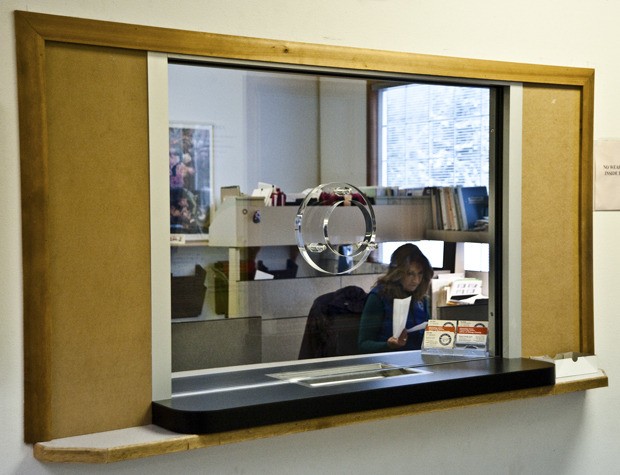After not paying rent on the home of Bainbridge Island’s Municipal Court for five months, the city decided to pay its January rent as a measure of good faith, according to City Manager Brenda Bauer.
Previously the city only paid its first month’s rent in July and currently owes $11,375 in past rent. There is also 10 percent in late fees and an $18 interest fee for unpaid balances, according to Jim Kennedy a local real estate broker who was involved in keeping the court on the island when the city considered moving it to Poulsbo. Kennedy has been helping the Rolling Bay building’s landlord, Tord Vestman, deal with the city.
Though from the city’s perspective, only the unpaid rent will be offered.
“Upon resolving the remaining construction issues and (the landlord) receiving a final occupancy permit, the city will provide (the landlord) with a check for all rent withheld in 2011 — without penalty or interest minus any City expenses…,” Bauer said in a Jan. 3 letter to Vestman and Kennedy.
The rent has been withheld as part of a dispute between the city and Vestman. From the city’s perception, the landlord has not completed improvements to the building as required by the lease agreement. Though it has been debated as to whether the improvements have actually been completed or not.
At the city’s Aug. 24 meeting, Bauer told council that she had not received a performance bond or any report on the progress of improvements to the building. According to the lease that the city drafted, it required the landlord to make a number of improvements to the building such as replacing chairs, installing additional lighting and installing bulletproof glass. The improvements were to be completed within 90 days, starting June 16.
In August, the city decided to withhold rent until work was completed and a performance bond was produced. The bond is a financial guarantee that ensures payment for work to be performed, and the city’s lease includes a clause stating that the landlord is required to obtain a performance bond of $30,000.
“It is unfortunate that the landlord is asserting that they are never required to provide a performance bond, even though the lease agreement requires it,” Bauer said. “The refusal before and throughout the improvements to provide the required performance bond is troubling, particularly since the tenant (the city) is not satisfied that the improvements are complete.”
Kennedy also addressed the council at the Aug. 24 meeting and reported that all work was on schedule and expected to be done within the 90-day time frame. He argues that a performance bond was never actually required in the lease. He said that a performance bond would only be relevant if work wasn’t able to be completed within the 90-day time frame due to financial complications, and since work was finished with no financial barriers, the bond was not needed.
Kennedy further said that essential details for the performance bond were not included in the lease.
“Artful drafting requires that you provide a date and a remedy if the performance bond is not provided,” Kennedy said. “The city drafted a contract that provided for neither.”
According to Kennedy, all required work on the building was completed in September, before the 90 days was up, except for the installation of the bulletproof glass.
The glass was paid for, but had to be custom made. The building’s owner had no control over how long the glass would take to produce, deliver and install. The glass was finally installed at the beginning of October.
Though, as all work required by the lease was finished — which the city questions — further issues arose when Vestman decided to install a new heating system in the building. Installing a heating and cooling system was originally mentioned in the lease, but was removed. Vestman wanted to put one in anyway as the old system wasn’t holding up and was expensive to operate.
“Formerly the heat was done by wall heaters and was very inefficient, so staff had to use space heaters under their desks,” Kennedy said.
When city officials saw the new heating system, they raised issues with the ventilation of the building.
“If we turned this (new) heat system off, and went back to the wall heaters we would be in compliance,” Kennedy said. “But the cost to the city would go up about 60 percent a month in the electric bills.”
According to Bauer, the lease also requires that improvements must meet building codes, specifically: the new heating system; bulletproof glass that doesn’t open or close; and accommodations to keep fresh air circulating through the building.
“Because the work thus far does not meet indoor air quality (and) basic ventilation standards, the landlord cannot get a completed occupancy permit,” Bauer said.
Vestman and Kennedy submitted a plan to the city for better ventilation, but the city insisted upon receiving a plan drafted and stamped by a qualified engineer. Vestman has since hired an engineer at $150 an hour to design an adequate ventilation system. So far Vestman has invested $16,000 for the heating system, and he may have to spend and additional $5,000 to accommodate the new ventilation system.
Vestman also previously reduced the city’s rent by around $1,000 to help keep the court on the island.
Vestman and Kennedy hope that after they submit the engineer’s plan to the city, rent payments will resume, and rent from the past five months will be paid.
In 2011, the city considered sharing a court with Poulsbo in its new city building though there was considerable opposition by island community leaders.
Eventually the proposed deal fell through and Vestman and others in the community decided to improve the security of the building without the city’s financial input.



